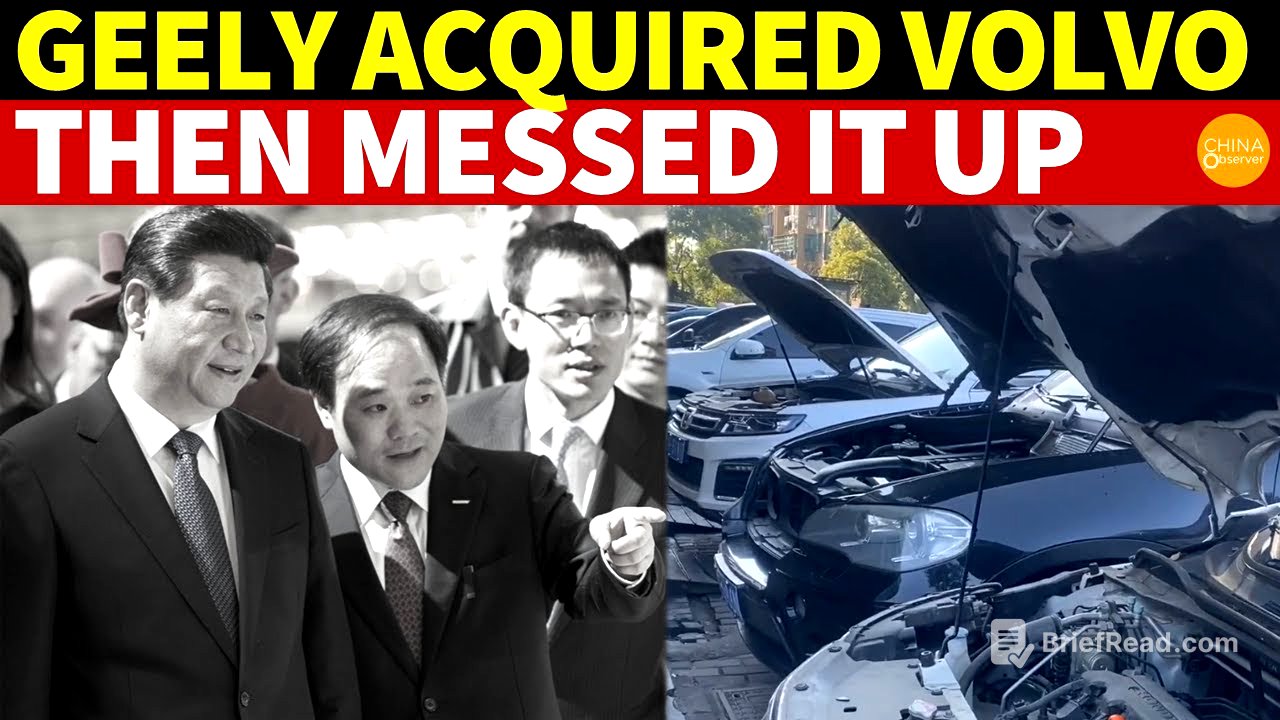TLDR;
This video discusses the challenges and strategies surrounding Chinese car manufacturer Geely, and Volvo. It covers issues with Geely car quality, its government-backed acquisition of Volvo, and the broader implications of China's "nurture, trap, kill" strategy in the automotive industry, exemplified by Tesla's experience in China. The video also touches on declining Chinese car exports to Russia due to quality concerns and policy changes, as well as increasing tariffs on Chinese EVs in the US and EU.
- Geely car quality issues and service problems.
- Geely's acquisition of Volvo with Chinese government support.
- China's "nurture, trap, kill" strategy impacting foreign automakers like Tesla.
- Declining Chinese car exports to Russia due to quality and policy changes.
- Increasing tariffs on Chinese EVs in the US and EU.
Quality Concerns with Geely Cars [0:03]
The video begins with a car owner expressing frustration over the frequent mechanical issues with his Geely Shin Rui, which has required multiple repairs in a single year. He highlights problems with the fuel and ignition systems, and the overcrowded, inefficient service centres. He advises caution when considering purchasing a domestically made car due to these quality and service concerns.
Geely Galaxy L Car Quality [1:05]
The presenter examines a damaged Geely Galaxy L, revealing a thin bumper reinforcement beam lacking even basic foam padding. He contrasts this with better-equipped joint venture models that include pedestrian safety features. The presenter criticises Geely for hyping up their cars while cutting costs on essential safety components, suggesting the car cannot compete with joint venture models.
Geely's Rise and Volvo's Decline [1:47]
The video discusses Geely's history as the first privately owned car manufacturer in China, its acquisition of Volvo in 2010 with strong government backing, and its subsequent investments in other major automotive companies. However, it notes that Volvo has faced challenges in China, including significant layoffs and declining sales. In 2024, Volvo's sales in China dropped by 8%, and in the first quarter of 2025, they fell by another 12%.
Government Support and Strategic Acquisition [3:50]
Before Geely's acquisition of Volvo, China's automotive industry was dominated by state-owned and joint venture companies. Geely's successful acquisition of Volvo was exceptional due to several factors: it allowed China to gain technological expertise without overt state involvement, filled gaps in Geely's capabilities, and provided Geely with government protection. Founder Li Shufu's close ties with CCP officials, including Xi Jinping, further facilitated the acquisition, with state-owned funds providing significant financial backing.
China's "Nurture, Trap, Kill" Strategy [7:59]
The video explains China's strategic approach to foreign acquisitions and investments, summarised as "nurture, trap, kill." In the nurture stage, foreign companies are allowed to profit while being encouraged to transfer technology and collaborate locally. In the trap stage, incentives like tax cuts and market access lure foreign companies further into the market. Finally, in the kill stage, the government supports domestic companies through subsidies and regulations, limiting the growth of foreign businesses.
Tesla's Experience in China [8:57]
Tesla's Shanghai Gigafactory is presented as a prime example of the "nurture, trap, kill" strategy. Initially, Tesla received favourable conditions, including low-interest loans. However, Tesla's market share in China has since declined due to increasing competition from domestic brands like BYD and Geely. This decline is attributed to technology transfers, policy support, and the cost advantages of Chinese companies.
Geely's Technological Advancement and Market Impact [10:43]
Geely has strengthened its capabilities through the acquisition of Volvo and the establishment of a joint R&D centre in Sweden (CEVT). CEVT's modular platforms and technological advancements have enabled Geely to launch cost-effective EVs, directly competing with Tesla. This has led to a decline in Tesla's market share in China. Geely has also used CEVT's platforms to develop alternative models, further impacting Volvo's market share.
Challenges in the Russian Market and Global Countermeasures [14:44]
The video notes that Geely is pulling out of the Russian market, reflecting a broader trend of declining Chinese car exports to Russia due to market saturation, stricter import policies, and quality issues. Additionally, the US and EU have implemented countermeasures, including increased tariffs on Chinese EVs, to address unfair trade practices. The US has raised tariffs to 100%, while the EU has imposed countervailing duties of up to 45.3% on Chinese EVs.





![Peppa Pig - Granny and Grandpa's Attic (42 episode / 2 season) [HD]](https://wm-img.halpindev.com/p-briefread_c-10_b-10/urlb/aHR0cDovL2ltZy55b3V0dWJlLmNvbS92aS9pWmltUlJDU3h6SS9ocWRlZmF1bHQuanBn.jpg)


